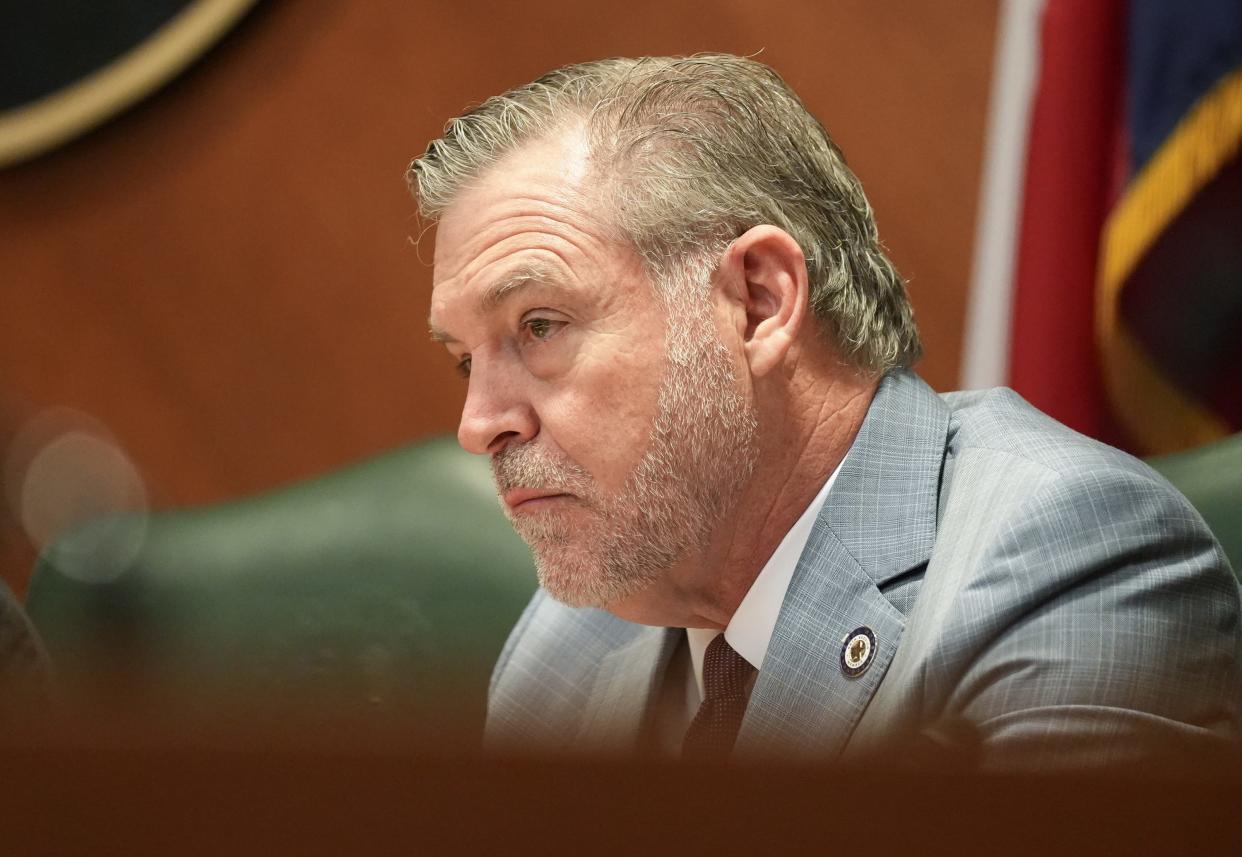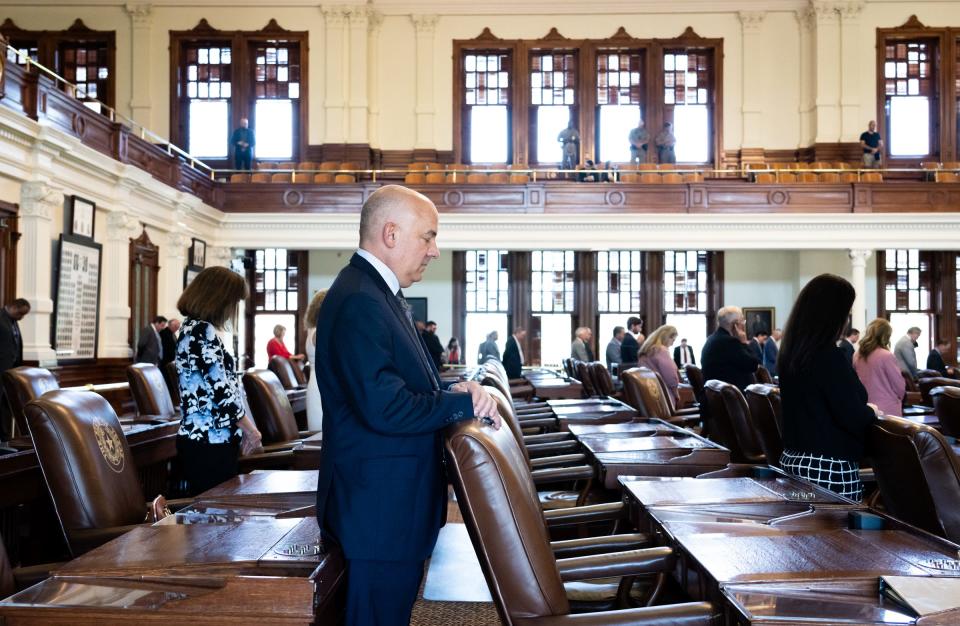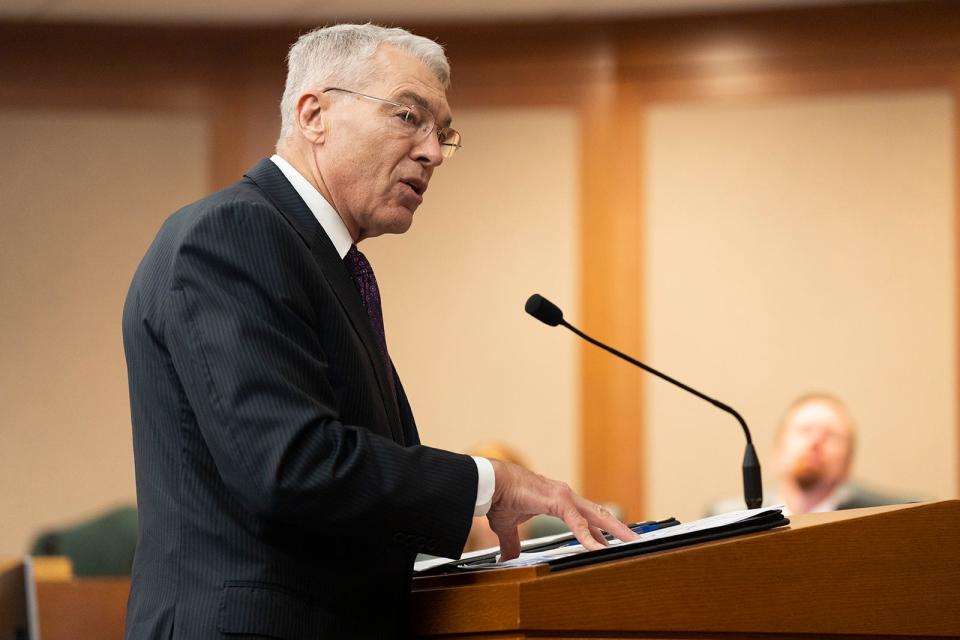Texas Senate advances bill to expel people suspected of illegally entering US

- Oops!Something went wrong.Please try again later.
- Oops!Something went wrong.Please try again later.
Without publishing public notices, the Texas Senate on Thursday advanced border security and school choice bills that Gov. Greg Abbott has pushed for all year and for which he called a fourth special session.
The Senate, along partisan votes, advanced legislation allocating $1.54 billion to build segments of a border wall, laying the ground work for a school voucher program, and mandating anyone believed to have illegally crossed the Texas-Mexico border to leave the country.
With broad support, the chamber also passed Senate Bill 2, a $5.2 billion school finance bill that increases per-student funding by $75, offers teacher retention payments of $10,000 per teacher for districts with 5,000 students or fewer and $3,000 per teacher for districts with more than 5,000 students, and increases school safety spending.
As the Senate convened around 3 p.m. Thursday, members approved a motion to suspend the chamber's rules to allow committees to meet and immediately advance the proposed bills. The Senate committees on finance, education and state affairs then held nearly concurrent meetings, making public postings giving notice of the impromptu hearings only after they had concluded.
On account of the rush to pass the bills, the finance mechanisms for school vouchers, which would make state money available to pay for students' private education, and the border wall construction received no public testimony. There was also limited testimony on Senate Bill 4, which requires those who enter the country illegally to accept a judicial order to return to Mexico or face criminal penalties.
Earlier in the day the House Committee on State Affairs advanced an identical bill to SB 4, and it is expected to get a hearing in the full House within the coming days.
As the Senate returned to the floor Thursday evening, members voted to suspend other procedural rules to allow the bills to pass through the full Senate on the same day as they were heard in committees.
During the Senate debate, which grew increasingly testy through the night as lawmakers continued discussing the effects SB 4 would have on both migrants and Texans, Lt. Gov. Dan Patrick, who presides over the chamber, was absent from the dais due to a viral pneumonia diagnosis that has sidelined him this week.
Sen. Charles Schwertner, R-Georgetown, who serves as president pro tempore, filled in for Patrick and navigated a series of votes that rejected proposed amendments to limit the scope of law enforcement authority under SB 4, provide protections for children and asylum seekers, and ensure legal representation for migrants.
After a lengthy debate between Sens. Charles Perry, R-Lubbock, the bill's author, and Roland Gutierrez, D-San Antonio, in which the two discussed concerns about the potential increases in racially motivated arrests, a coalition of Democrats presented an amendment that would have only allowed law enforcement officers to arrest someone they saw crossing the border outside of an international port of entry.
"Without this amendment the bill could violate the rights of those who simply look like minorities, speak English with an accent or aren't carrying proper documentation," said Sen. Judith Zaffirini, D-Laredo, when she presented the amendment, which was rejected along party lines.
After SB 4 passed on an initial 17-11 vote, the Senate then adjourned and reconvened again to begin a new legislative day and take a final vote to advance each of the bills on illegal entry penalties, border wall funding and school vouchers.
After carrying the illegal entry penalty legislation all year, Sen. Brian Birdwell, R-Granbury, spoke against the version of the bill Perry authored and the Senate passed Thursday night, and was the lone Republican to vote against it.
Birdwell said he feared advancing the bill would be a violation of his oath to serve the U.S. Constitution and would be a bad precedent for the state in usurping the authority of the federal government.
"For present ease of messaging, we are creating a false expectation of a bill as a solution that is decidedly outside the bounds of the constitutional construct," Birdwell told the Senate before the final vote.
Perry said the situation at the border and the federal government's inaction leaves Texas with no choice but to create state penalties to discourage illegal immigration.
"We are testing and pushing envelopes," Perry said. "The state has every right to protect its citizens and this nation has every right to expect Texas to do that."
The Senate voted Thursday night to recess until 2 p.m. Monday. The House is scheduled to meet Friday at 10 a.m.
House panel mandates a return to Mexico for those who illegally cross the border
The Texas House Committee on State Affairs on Thursday advanced a familiar but reworked border security proposal aimed at stemming the flow of migrants entering the U.S. without authorization in Texas. Immigration and rights advocates, however, are raising concerns over the state's attempt at immigration law and its unknown cost to taxpayers.
House Bill 4 by Rep. David Spiller, R-Jacksboro, has been heard several times throughout the series of special sessions that Gov. Greg Abbott has called this year to focus on border security and school voucher legislation.
The bill's latest version, which the committee passed by an 8-4 vote, would require people accused of illegally crossing the state's southern border outside of a port of entry to accept a magistrate judge's order to return to Mexico or face prosecution with possible penalties ranging from a Class A misdemeanor to a second-degree felony.
More: Texas lawmakers debate school choice, finance bill again in fourth special session
Spiller argued that arrests made under the bill would be concentrated in the border region and that it's not his intent to target for arrest anyone whose is already living in Texas under an undocumented status.
"This bill is not about if someone's here illegally; it's if they crossed into our state from a foreign nation at some illegal place, a place other than a legal port of entry," Spiller told the committee Thursday. "This is not a round up everybody here that's here illegally and ship them back to Mexico."
The bill's opponents raised concerns over the incalculable cost of the increased prosecutions and arrests, the constitutionality of the bill as the federal government has dominion over immigration law, and the potential for U.S. citizens to be caught up under the bill's broad authority.

Rep. Chris Turner, D-Grand Prairie, called Spiller's belief that most arrests would occur within 50 miles of the Texas-Mexico border "speculative," as no language in the bill would limit the scope of where law enforcement officers can detain someone suspected of entering the country illegally.
"So most of the enforcement of this bill would be closer to the border, but there's nothing that prevents an action under this bill from happening in all 254 counties," Turner said. "Any county sheriff or law enforcement officer could make an arrest under the provisions of this bill."
Arrests under the bill would be prohibited in schools, churches, hospitals and facilities that provide forensic medical examinations for sexual assault survivors.
Before being taken by law enforcement back to a point of entry, a detainee would have their fingerprints and biometric data recorded, along with a background check against law enforcement databases. The inclusion of the record-keeping provisions is something Lt. Gov. Dan Patrick has advocated for as the House and Senate have quibbled over the bill in recent weeks. Patrick thanked Spiller and Sen. Charles Perry, R-Lubbock, for adding the measures as a show of bicameral compromise in the chambers' separate but identical proposals.
As the House State Affairs Committee voted to advance the bill, the Senate State Affairs Committee began an impromptu hearing to consider that chamber's companion bill. The committee then passed Senate Bill 4 by a 7-3 vote along partisan lines.
With the bills advancing in their respective state affairs committees, each chamber will likely take them up for consideration in the coming days.
Testifying before the committee, Texas Department of Public Safety Director Steve McCraw said that his agency could see as many as 88,000 arrests under the new proposal.

"I can't see any more than that," McCraw told the committee in anticipating the bill's effect on law enforcement. "So, it's going to be less than that, and that would be huge."
McCraw, making a comparison to criminal trespassing arrests made along the border, said the DPS has made 9,000 such arrests under Operation Lone Star — a border security initiative Abbott launched in 2021 and lawmakers have directed more than $10 billion to fund.
According to the Legislative Budget Board, the fiscal impact of HB 4 "cannot be determined" by the Office of Court Administration, although a rise in arrests and costs to support indigent defense, additional visiting judges and interpreters to conduct magistration hearings is anticipated.
For reference, according to the Legislative Budget Border, counties can handle 1,843 misdemeanors with $1 million and 1,548 felonies with $750,000.
Outside of cost concerns, immigration lawyers expressed fear that the bill puts in jeopardy people living in Texas with varying immigration statuses and that the bill, and the state, are not equipped to adjudicate the issue.
A lack of due process and the potential for limited legal representation for those accused under the bill were recurring complaints from immigration advocates.
Others worried that people living in the U.S. legally who do not speak English could be mistakenly targeted and improperly ordered to leave the country under HB 4.
"Some bad policemen can kill people without asking a question; now they can arrest any of us without question too," Alice Yi, with Asian Texans for Justice, said about the bill's potential. "So this creates more consequences for lawsuits and more money for the state."
This article originally appeared on Austin American-Statesman: Texas Senate, House panel advance illegal US entry penalties bill

